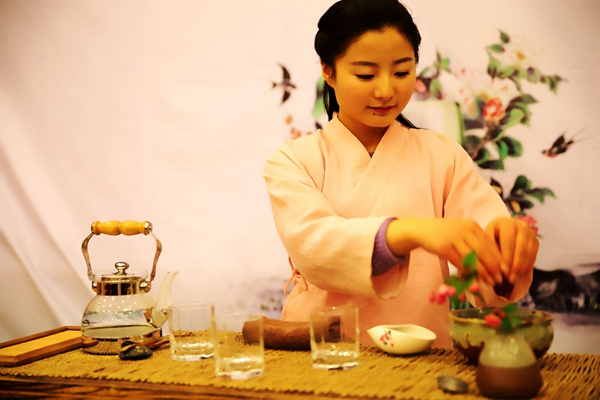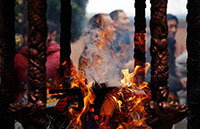Online sales effort highlights tea's growing popularity
By MA SI/WANG WEN (China Daily) Updated: 2016-04-04 11:32
 |
|
A worker performs a tea art ceremony in the Lanyi Teahouse in Suzhou, Jiangsu province. LONG WEI/CHINA DAILY |
The company collected its first batch of the tea before the snow came, Sun said, but the quality of this year's harvest has not been affected, as temperatures rose quickly after. It did, however, mean that 20-30 percent less tea was picked before its traditional time.
Some of China's major tea-growing areas were affected by the late snow flurry, such as Sichuan province, Guangdong province and Anhui province, which in turn slowed the growth of spring varieties, according to China Tea Marketing Association, which is now expecting lower yields than last year.
On the plus side, officials said that the cold snap did manage to kill off pests which might have affected the crop later. They insist the quality of spring tea will be unaffected, but concede average prices will be a little higher than last year, as a result.
"We lost six growing days because of the cold wave," said Chen Gang, general manager of Chuan Hong Group, a Yibin, Sichuan province-based tea group, who says it will be increasing production to make up, as the weather gets warmer.
Yibin is considered the birthplace of Chinese tea, and its spring teas have the earliest harvest seasons of any areas at similar latitudes.
- Activists want dog festival taken off the menu
- 'Exotic names' will soon vanish
- Chinese 'parachute kids' flock to US schools
- Chinese writer wins top prize for authors of children's books
- Li: Tax reform to boost vitality of real economy
- Once-endangered pony makes comeback
- Xi's meeting with Obama 'eases tensions'
- Signs in Chinese would help France attract more visitors
- Bookshop worms way into community
- Chinese eye eco-burials as graveyards fill up








